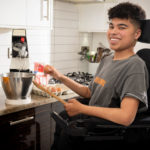Planning for College or University
Planning for College or University
Last checked: July 2025
Scroll down for our checklist of things to think about.
Our October 2024 episodes of *Uni Bound* offer further tips and suggestions from the SMA Community.
You will find them and other community voices if you follow the links in Thinking about University >
You might also want to read Whizz Kidz A-Z of going to University >
The Uni Guide > – helps students make more informed decisions about their higher education choices
Disability Rights UK / Into Higher Education > – is updated every year. It aims to answer common questions including whether colleges or universities will be accessible, how to choose a course and what support will be available.
Gov.UK / find and apply to higher education courses > – has many helpful links
You might want to ask in advance for a personal tour of the campus to look at the whole thing, rather than what they might show to any other student. They may say come on a different day to the main open day, as those days can be very busy. You could then ask to meet with the disability advisor / support team at the same time.”
Make a list of what is important to you and the questions you want to ask before you go.
It is always good to ask questions yourself. If you do want your parents or carers to sometimes speak for you, you must tell people like the Disability Support Team that you give your consent for this. Otherwise they will only talk to you."
Open the tabs below for some suggestions of what to find out.
Suggestions of what to find out:
- What you will study
- How many hours of lectures and other forms of teaching and contact there will be?
- Will there be exams or coursework – what balance do you prefer?
- Will there be any fieldtrips? How will your accessibility and support needs be managed?
Most universities offer accessible accommodation, although sometimes they partner with other areas to help provide this. Generally, these rooms are fitted out for disabled students. Make sure to actually see at least one and how well it will meet your needs.
Suggestions of what to find out:
- Is the room and bathroom you would be offered fully accessible?
- What about any communal areas like the kitchen / diner?
- If you are going to need a live in PA – will their room be close by?
- How far is it from the main campus and where you will go for lectures and other activities?
- How many of these rooms are there for disabled students? How early would you need to apply to get one?
- Once you are there can you stay there right through your studies, or will you be expected to move out? If so when and how often?
If you see the room and think there is something missing that you may need, then ask if it can be added. Do not be afraid to ask.
Suggestions of what to find out:
- If you will be driving, will there be accessible parking spaces?
- How accessible are the lecture theatres, canteens, leisure activities and the student union?
- How far is it between places?
- Will you have time to get from your room to a lecture and then to the next one?
- Where will you you have lunch – how far is that?
Suggestions of what to find out:
- What will be on offer that appeals to you?
- How inclusive are they already?
- Will they make reasonable adjustments if you need them?
- Is there a disabled students’ society, network or committee that might be of interest? Would it offer opportunities for discussion, support and socialising?
If you think you may need some mental health and well-being support, you can ask about this in advance. There may be a waiting list or they may need to contact local services to support you.
If you are going to move away from home:
- What GP and other health services are available?
- If you are taking risdiplam or any other medications check with your specialist centre how you will get new prescriptions
- If you are receiving nusinersen, will travelling to and from your specialist centre still work or would you need to transfer to one closer to Uni?
You may want to ask about what assistive software might be possible if you think you may need it.
If you have had difficulties with reading and processing information, the Disability Support Team can tell you about access to Dyslexia Screenings and Diagnostic Assessments for students with indications of dyslexia or some other specific learning difficulty. If possible, it is best not to wait to get support until enrolling at university – talk to your parents and teachers now.
Your school or college will support you to make your UCAS application. There is room on this to add information about what accommodation and other support your will need.
You will need to start the ball rolling for any Funding and Care Packages you will need. See Disabled Students Allowance> and Care Packages for University >.
When you do know where you are going, try to attend any events for new students that are held over the summer before you start. These may be webinars or summer schools. If you will need support to do this contact the Disability Support Team.
Our October 2024 episodes of *Uni Bound* offer further tips and suggestions from the SMA Community.
You will find them and other community voices if you follow the links in Thinking about University >
- would like a printed copy of this information
- have questions we haven’t answered
- need support
